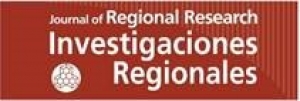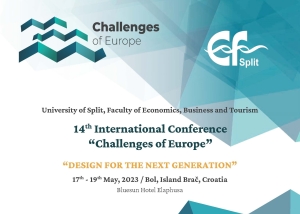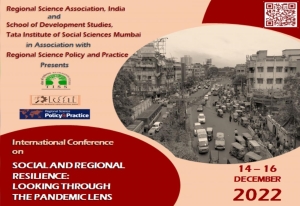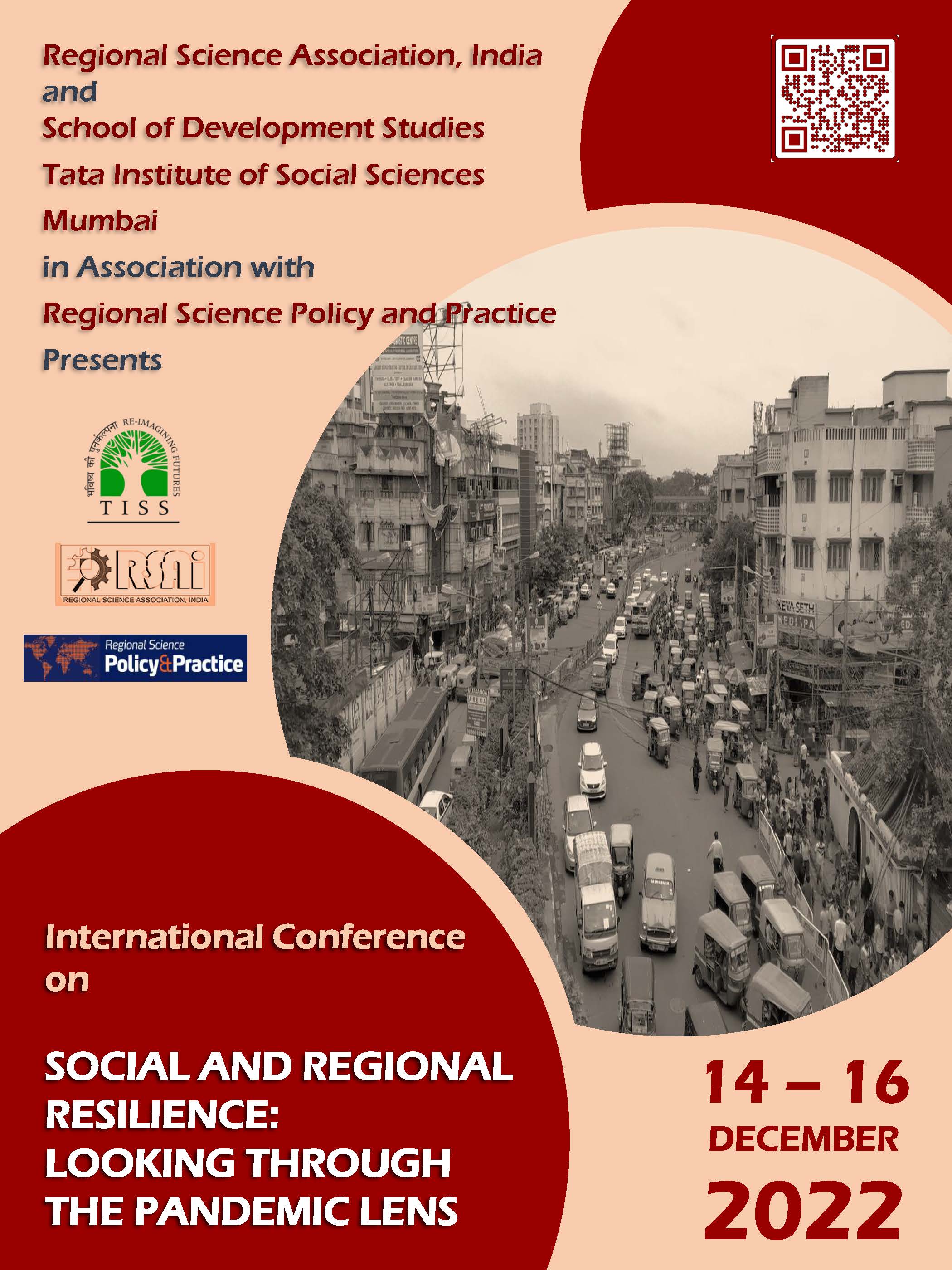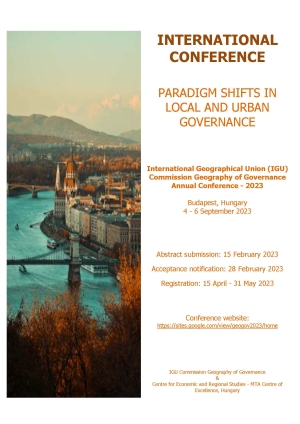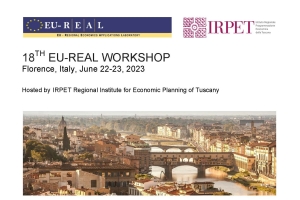Archives
Elisabete Martins
RSAI Newsletter (November 2022)
Dear RSAI members,
I hope this email finds you well.
I am pleased to write you to send you the newest issue of the RSAI Newsletter (download).
Enjoy the read, and please do not hesitate to get in touch with Martijn (This email address is being protected from spambots. You need JavaScript enabled to view it.) and Mina (This email address is being protected from spambots. You need JavaScript enabled to view it.) to propose new material for the newsletter.
Kind regards,
The Annals of Regional Science, Volume 69, Issue 3 - New Issue Alert
|
Unlocking the Potential of Regions Through Entrepreneurship and Innovation |
|
|||
|
|
|||
|
|
|
|
|||
|
|
|
|
|||
|
|
|
|
|||
|
|
|
|||
|
|
|
|
|||
|
|
|
New Issue 54 of Investigaciones Regionales - Journal of Regional Research
Investigaciones Regionales - Journal of Regional Research has published the Issue 54, the third volume corresponding to 2022, the year in which the Journal celebrates its twentieth anniversary.
This 2022, the flagship journal of the Spanish Association of Regional Science has been positioned in the First Quartile (Q1) of Scopus, and for the incoming 2023 will receive a Journal Impact Factor in the Web of Science Core Collection of Clarivate.
Below you will find the abstracts of the papers published in this Issue, which can be accessed at https://investigacionesregionales.org/en/revista/issue-54-winter-2022/
We invite authors to submit papers at https://investigacionesregionales.org/en/envio-de-articulos/submission-of-papers-and-others-contributions/
European Regional Policy
Luciana Lazzeretti, Stefania Oliva, Niccolò Innocenti
Unfolding Smart Specialisation for Regional Economic Resilience: the role of Industrial Structure
The European Regional Development Funds for the programmatic cycle 2014-2020 aims to support regions that implement an innovation strategy based on Smart Specialisation. Within this framework, the European Commission emphasises the role of smart specialisation in favouring regional transformation, enhancing competitiveness and fostering resilience. However, the concepts of smart specialisation and resilience have been poorly combined. The article aims at investigating their relationship to understand if a smart specialisation strategy may promote the economic resilience of regions in response to major economic shocks. Drawing upon the concepts of adaptation/adaptability, the analysis investigates the relatedness of new industrial specialisations to the existing industrial structure before and after a shock occurrence. Evaluating the resilience of Italian provinces in relation to the economic crisis of 2008, the analysis aims to understand if provinces that resisted and recovered better followed a smart specialisation framework where new industrial specialisations are related to the existing industrial structure.
Keywords: Industrial structure; resilience; relatedness; smart specialization
Articles
Domingo Rodríguez Benavides, Miguel Ángel Mendoza González, Nancy Ivonne Muller Durán
Regional covergence in Mexico: a test of weak s-convergence
The objective of this paper is to provide evidence on the convergence hypothesis in Mexico through a relatively novel test, the weak s-convergence test applied not only to the whole period analyzed but also to different periods, which depend on the location of the break year representing trade liberalization, either 1986 or 1995, as well as to different groups classified according to terciles such as high, middle and low income. The results show that only in the first period we find evidence of this type of convergence for all the states, regardless of where the break year is located, while for the second period and for the whole period as a whole we find no evidence of weak s-convergence, however, we find evidence of weak sigma-convergence in both periods for the high and middle income groups but not for the low income groups, which suggests that the results found for all the states can be attributed to the behavior that the low income states show in this last period. Additionally, these results are consistent with the traditional sigma-convergence analysis.
Keywords: Economic growth; weak s-convergence; regional inequality; Mexico
Jan Wolf, Marco Marto, Mara Madaleno, João Lourenço Marques
The adjustment of primary schools to shrinking populations: a spatial modelling approach
The adjustment of services of general interest to ageing and shrinking populations is a significant challenge in many European regions. This article analyses the response in the number of primary schools to changes in the student population in the municipalities of mainland Portugal between 2007 and 2016. It focuses on the time lag of this adjustment, the territorial factors that influence it and the role of spatial spill-over effects. The main finding is that the relationship between the number of schools and the number of students is not straightforward and can only be understood considering the broader geographic contexts and spatial dependence structures.
Keywords: Population growth; primary schools; spatial modelling; Portugal; spatial dependence
Eduardo Rodrigues Sanguinet, Gabriel Rodríguez-Puello
Tertiary industries’ value-added as a linkage’s engine: An interstate input-output application for Brazilian regions
Tertiary industries’ value-added have been considered an essential input for any production chain, as they have the potential to connect regions and services activities across networks. Moreover, spatially, services move more straightforward than the manufacturing of resource-based industries. This study estimates the interregional and inter-industry linkages regarding a set of services-related economic sectors and accounts for the trade in value-added (TiVA) measures, considering intraregional and interregional trade based on an interstate input-output application for Brazil. The main findings reveal that the poorest Brazilian states tend to lose linkages opportunities in services activities, remaining hostages to supply natural resources to production networks for subnational and foreign demand. On the other hand, the potential for gains from connections in the services’ networks reveals greater spatial dispersion across regional hierarchies, increasing the concentration in large urban agglomerations. In this regard, the paper concludes that the connectivity potential of services at the intraregional level can be an essential starting point to promote innovative systems away from large urban areas in the wealthiest regions inside Brazil, potentially reducing value-added imbalances in internal geography trade flows.
Keywords: Tertiary activities; services trade; value-added trade; structural linkages; vertical
Luis Enrique Santiago, Boris Graizbord
Knowledge-Intensive Employment Growth in Mexican Cities, 2004-2019
This article analyzes the changes in employment in Knowledge Intensive Services (KIS) in Mexican cities between 2004 and 2019. Methodologically, the service sector is defined according to intensity and type of knowledge, and the dynamic shift-share and the cluster analysis are applied. The results indicate that the growth of KIS is mainly the product of the conditions that each city offers, which are not only defined by their size but also by their geographic location and interurban links. The performance of KIS though calls into question the competitive capacities of the country’s urban economies in the global economy.
Keywords: Knowledge-intensive activities; components of growth; urban system
Books reviews
María Hierro Franco
The Great Reset. 2021 European Public Investment Outlook
The book “The Great RESET. 2021 European Public Investment Outlook” is an excellent reference for those researchers interested in understanding the unprecedented role attributed to public investment in the European Union (EU) hand in hand with the Next Generation EU Recovery Plan (NGEU), to counteract the effects of the pandemic and, likewise, generate new opportunities linked to a sustainable growth model that promotes economic, social and territorial cohesion. Through this work, the reader will have the opportunity to revise, thanks to the contributions of outstanding international experts, the strategic role played by public investment in the present, and especially in the future. In the words of Professor Olivier Blanchard, “this book is simply essential reading”.
To contact Us and Submit Manuscripts:
Investigaciones Regionales – Journal of Regional Research
Email: This email address is being protected from spambots. You need JavaScript enabled to view it.
The article will be sent through the portal Open Journal System (OJS) of the Spanish Repository of Science and Technology (RECYT): https://recyt.fecyt.es/index.php/IR/login
ISSN: 1695-7253 E-ISSN: 2340-2717
Call for paper | 14th International Conference “Challenges of Europe”, 17-19 May, 2023, Bol, Island Brač, Croatia
14th International Conference“Challenges of Europe”
“DESIGN FOR THE NEXT GENERATION”
17th - 19th May, 2023 / Bol, Island Brač, Croatia
Bluesun Hotel Elaphusa
Keynote Speakers
|
Prof. Eric Maskin |
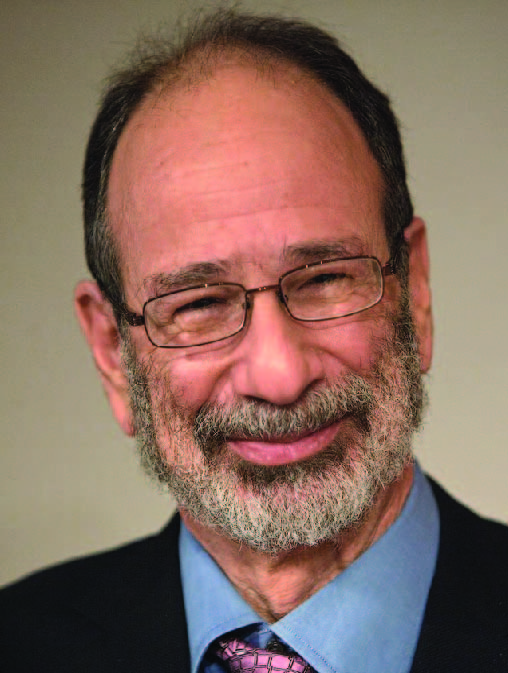 Prof. Alvin Roth |
 Prof. Edward Altman |
|
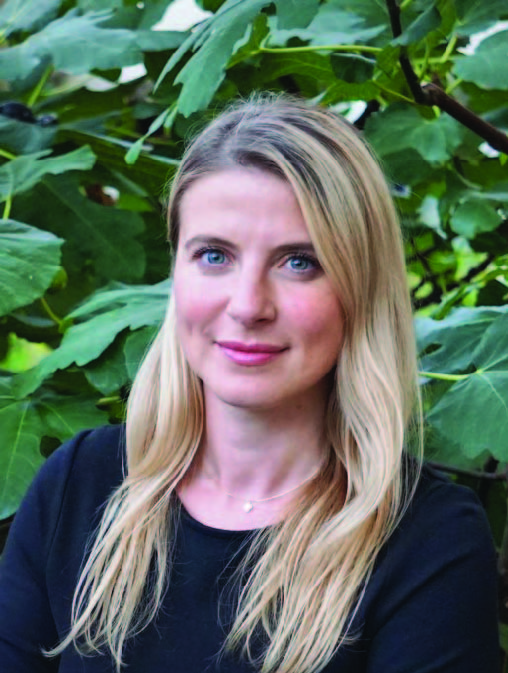 Assoc. Prof. Özge Öner |
For details on the registration fees and options please visit:For details on the registration fees and options please visit: www.conference.efst.hr
Extended deadline for abstracts submission | 53rd RSAIndia Conference | 14-16 December, 2022, TISS Mumbai, India
IGU CGoG 2023 Annual Conference, Budapest , 4-6 September 2023
INTERNATIONAL CONFERENCE
PARADIGM SHIFTS IN LOCAL AND URBAN GOVERNANCE
IGU Commission Geography of Governance
Annual Conference - 2023
Budapest, 4 - 6 September 2023
CALL FOR PAPERS
The International Conference 'Paradigm Shifts in Local and Urban Governance', convened by the International Geographical Union (IGU) Commission on Geography of Governance, and organized in collaboration with the Centre for Economic and Regional Studies - MTA Centre of Excellence, will be held in Budapest, Hungary, on September 4 - 6, 2023.
The Conference aims to explore and to discuss shifts and innovations in Local and Urban Governance, in the context of the increasingly complex and uncertain policy context, at multiple governance levels, namely in crisis management. It will be a forum for the discussion of the state-of-the-art of research on these issues.
Within this overall goal, the 2023 Annual Conference of the IGU Commission on Geography of Governance also aims to provide the opportunity for comparisons between countries, in different regions of the world.
The Conference will bring together researchers from academia, public and private sectors, non-governmental and non-profit organizations, in an effort to present and debate their research on local and urban governance, and to share knowledge, viewpoints, methods, research outcomes and policy ideas.
The conference is organized into three main tracks:
Track 1 - Institutional shifts in Local Governance - This track aims to examine and to discuss institutional shifts in local governance systems due to globalization, nationalization, decentralization, and digitalization, the challenges and innovations with which local governance is confronted, and to compare local government systems and practices in different regions of the world.
Track 2 - Resilient Local Governance - This track seeks to explore and to discuss the responses of local governance to natural and human made disasters, crisis and emergencies, namely local government climate actions, local government post-pandemic policies, energy crisis and transition, and the role of local government in post-war recovery.
Track 3 - Governance of Spatial Planning Systems - This track examines and discusses the role of spatial planning in shaping multi-level territorial governance, including coastal and marine spatial planning.
In each of these three tracks we welcome country and cross-country approaches, studies of individual cities or municipalities, and the comparison of cities, municipalities or countries with one another, and with those in other regions of the world. The scope of our sessions is international, including comparative research.
The Conference will be an opportunity for inter-disciplinary discussions on a broad spectrum of innovative research within the field of the Geography of Local and Urban Governance.
The final program may combine papers submitted for different tracks, if the paper' themes and approach so recommend.
We welcome abstracts of those engaged in the activities of the IGU Commission on Geography of Governance, as well as from anyone with a relevant contribution in this field.
The Conference is being planned as an On-site / In-person Conference.
PARTICIPATION IN THE CONFERENCE, SELECTION CRITERIA AND SESSIONS ORGANIZATION
• Participants in the conference are expected to present a paper.
• All co-authors present in the Conference must register (conference fee)
• All abstracts submitted will be double blind peer-reviewed by the Conference Scientific Committee for content and appropriateness to this conference.
• The working language of the conference is English.
• Translation service is not provided.
• The conference is organized in plenary sessions and parallel panels according to topics and issues.
• Each panel (2 hours) has 4 - 5 oral presentations.
• A time slot of 15 minutes is assigned to each speaker. This time slot includes introduction, presentation and discussion.
• The Conference rooms are equipped with computer (Windows and Office) and projection system. No equipment for presenting films or overhead transparencies will be available at the Conference.
• Oral presentations will be supported by PowerPoint only. Presentations will not be collected in advance. Participants are advised to take to the conference room the respective PowerPoint presentation.
REGISTRATION
● Registration (online): 15 April - 31 May 2023
● Conference fee: 100 € *
● Conference fee for Students: 50 € *
* - Due to the current uncertainty regarding inflation in Hungary, the organization may need to adjust this value. This information will be updated in January.
ABSTRACT SUBMISSION
● Please submit an abstract, of no more than 250 words, until 15 February 2023, to:
IGU Commission Geography of Governance
E-mail: This email address is being protected from spambots. You need JavaScript enabled to view it.
PUBLICATION
●The Conference does not publish 'Conference Proceedings'.
● It is expected that a selection of the conference papers will be published.
● More information on the Conference website ('Publication').
IMPORTANT DATES
● Submission deadline for abstracts: 15 February 2023
● Notification of abstract acceptance: 28 February 2023
● Registration: 15 April - 31 May 2023
● Conference: 4 - 6 September 2023
● PowerPoint presentation (PPT file): during the conference.
● Full paper for publication: date to be announced during the conference
CONFERENCE VENUE
● Centre for Economic and Regional Studies - MTA Centre of Excellence
Budapest, Hungary
FURTHER INFORMATION
● All inquiries, expressions of interests, and abstracts should be sent, by e-mail, to:
IGU Commission Geography of Governance
E-mail: This email address is being protected from spambots. You need JavaScript enabled to view it.
Next Eu-Real Meeting - Florence (Italy), 22-23 June 2023
IRPET Regional Institute for Economic Planning of Tuscany and EU-REAL are pleased to announce the 18th European Union Regional Application Laboratory (EU-REAL) Workshop, with a focus on “Regions and Cities in the Post-COVID world”.
We encourage contributions related to (but not limited to) the following topics:
• Regional economic development
• Regional inequalities
• Regional, urban and rural policy
• Infrastructure, transport flows and network among regions
• Tourism and regional development
• Migration and regional labor markets
• Regional healthcare planning
• Input-output, Computable General Equilibrium and other macro-models
• Spatial econometrics, statistics and other quantitative methods relevant for regional analysis
HOW TO PARTICIPATE
To participate in the workshop, an abstract of maximum 500 words must be sent to This email address is being protected from spambots. You need JavaScript enabled to view it., by March 15, 2023.
In addition to the abstract, the submission document must include authors’ names and affiliations, contact e-mail, and 3 keywords classifying it into the most appropriate themes/topics.
The workshop will be held in person and will host only abstracts accepted for presentation.
Participation in the workshop is free of charge.
You can find more information in the attached flyer. We look forward to your submission and hope to welcome you to Florence.
Marco Mariani
Open positions at POLIMI | Research and teaching assistant in the field of regional and urban economics
The Department of Architecture, Built Environment and Construction Engineering at Politecnico di Milano, and in particular the research unit focusing on regional and urban economics, seeks a research and teaching assistant with interests in the field of regional and urban economics. We look for a curious researcher, with keen interest in expanding her/his knowledge set, open to working and studying abroad, and interested in a research career. This position is for a 12-month term (renewable). The position is open both to candidates interested in a PhD as well as to post-docs.
Successful candidates will be involved in the research projects managed by members of the unit. Interested candidates can write Camilla Lenzi (This email address is being protected from spambots. You need JavaScript enabled to view it.) and Andrea Caragliu (This email address is being protected from spambots. You need JavaScript enabled to view it.) for further information.
We look forward to receiving your applications within Nov. 15, 2022.
Tenure Track Position in Urban Analytics, Toronto Metropolitan University
Tenure Track Position in Urban Analytics
FCS, Urban & Regional Plann.
| Posted: | October 24, 2022 |
| Deadline to Apply: | Wednesday, November 30, 2022 |
https://hr.cf.ryerson.ca/ams/faculty/preview.cfm?posting_id=545880
Located in downtown Toronto, the largest and most culturally diverse city in Canada and on the territory of the Anishinaabeg, Haudenosaunee and the Wendat Peoples, the School of Urban and Regional Planning (SURP) in the Faculty of Community Services at Toronto Metropolitan University (formerly Ryerson University) invites applications for a tenure track position at the rank of Assistant Professor effective July 1, 2023, subject to final budgetary approval.
The primary research interests of the successful candidate should be the application of Data and/or Geo-spatial Analytics in one or more of the following areas in Urban Planning: Urban Policy, Urban Design, Complex Urban Systems, and Connected Cities or Communities. We specifically welcome candidates who clearly demonstrate how their work in these areas advances more sustainable and equitable communities.The successful candidate will engage in a combination of teaching, scholarly research or creative activity and service duties while maintaining an inclusive, equitable, and collegial work environment across all activities. Teaching duties will entail teaching core and elective courses at the undergraduate and graduate levels, supervision of students and curriculum development, including in the areas of (advanced) Statistics, Planning Analysis, Research Methods and/or GIS. The successful candidate will pursue a strong, innovative research program or creative activity that is externally funded and that produces cutting-edge, high quality results. To support SURP’s continued accreditation success, it is expected that the successful candidate will achieve full membership as a professional planner with the Ontario Professional Planning Institute within five years of their appointment.
Candidates must have an accredited degree in Urban and/or Regional Planning and hold a doctoral (PhD) degree in Planning or a closely related field by the appointment date. Candidates who are all-but-dissertation (ABD) and are able to demonstrate that they are very close to completion may also be considered.
In addition, the successful candidate must present evidence of:
- a strong emerging scholarly research and/or creative activity that is current, innovative and impactful as evidenced by, but not limited to, peer-reviewed publications, working papers, public policy contributions, presentations at academic conferences, community engagement and professional work, success in securing grants, research related awards, and other writing or creative production that contributes to the visibility and prominence of the discipline;
- potential for teaching excellence at all levels of the undergraduate and graduate curriculums, as evidenced by a teaching dossier that includes a teaching philosophy statement, experience with course and curriculum review and/or development, examples of best practices in inclusive pedagogy, including the effective use of classroom technology and any experience with experiential learning, sample syllabi related to the position’s focus areas, strong teaching evaluations, teaching awards, and other relevant achievements in teaching;
- a commitment to our values of Equity, Diversity, and Inclusion as it pertains to service, teaching, and scholarly research or creative activities, including a demonstrated ability to make learning accessible and inclusive for a diverse student population; and
- an ability and willingness to contribute to the life of the School of Urban and Regional Planning and the University through collegial service.
Our committee recognizes that scholars have varying career paths and that career interruptions can be part of an excellent academic record. Candidates are encouraged to provide any relevant information about their experience and/or career interruptions.
This position falls under the jurisdiction of the Ryerson Faculty Association (RFA) (www.rfanet.ca). The RFA collective agreement can be viewed here and a summary of RFA benefits can be found here.
Toronto Metropolitan University (TMU)
Serving a highly diverse student population of over 45,000, with 100+ undergraduate and graduate programs built on the integration of theoretical and practical learning and distinguished by a professionally focused curriculum with a strong emphasis on excellence in teaching, research and creative activities, TMU is a vibrant, urban university known for its culture of innovation, entrepreneurship, community engagement and city-building through its award-winning architecture.
Department of Urban and Regional Planning (SURP)
The SURP is a significant contributor to Planning education in Canada with our professionally accredited undergraduate and Master’s programs. We are well-known for the quality of our applied approach to Planning education – especially our studio-based, experiential learning and career-ready focus – and 450+ excellent students from diverse backgrounds and geographies. We have 15 full-time faculty members. We recently celebrated our 50th anniversary, and over these five decades, we have developed strong and diverse community and professional partnerships to create important teaching and research opportunities. We have a large, loyal and engaged alumni network.
At SURP we highly value teaching, learning and research that unfolds in partnership with communities, governments, and private sector firms to deliver positive outcomes for more equitable, sustainable, and livable communities. Our experiential learning approach grounds planning education in working with communities, not for them. The School is also actively engaged in advancing anti-racism and anti-discrimination work in planning education, including centering equity and racial justice in our curriculum, student recruitment and retention, hiring practices, and approaches to community engagement. Our School prides itself on the excellence of its research and on the quality of its teaching. We are interested in candidates who will contribute to our existing teaching and research strengths through academic and professional excellence, diverse lived experiences and innovative perspectives.
Visit us on twitter (@TMUsurp) and LinkedIn for updates on our research, teaching and community-engagement activities.
Working at TMU
At the intersection of mind and action, Toronto Metropolitan University is on a transformative path to become Canada’s leading comprehensive innovation university. At TMU and within our department/school, we firmly believe that equity, diversity and inclusion are integral to this path; our current academic plan outlines each as core values and we work to embed them in all that we do.
Dedicated to a people first culture, TMU is proud to have been selected as one of Canada’s Best Diversity Employers and a Greater Toronto’s Top Employer. We invite you to explore the range of benefits and supports available to faculty and their family, including access to our diverse faculty and staff networks.
Visit us on Twitter: @torontomet, @VPFAtorontomet and @TorontoMetHR, and our LinkedIn page.
TMU is committed to accessibility for persons with disabilities. To find out more about legal and policy obligations please visit the accessibility and Human Rights websites.
Toronto Metropolitan University welcomes those who have demonstrated a commitment to upholding the values of equity, diversity, and inclusion and will assist us to expand our capacity for diversity in the broadest sense. In addition, to correct the conditions of disadvantage in employment in Canada, we encourage applications from members of groups that have been historically disadvantaged and marginalized, including First Nations, Métis and Inuit peoples, Indigenous peoples of North America, Black-identified persons, other racialized persons, persons with disabilities, and those who identify as women and/or 2SLGBTQ+. Candidates who self identify as belonging to a community historically underrepresented in Planning education and practice are especially welcome to provide details of how their lived experiences inform their work, if applicable.
How to Apply
Applicants must submit their application online via the Faculty Recruitment Portal [https://hr.cf.ryerson.ca/ams/faculty/] by clicking on “Start Application Process” to begin. Applications, consisting of the following, must be received by November 30, 2022:
- a letter of application;
- a curriculum vitae;
- a statement of research interests and future research agenda;
- two examples of scholarly, creative or professional work;
- a teaching dossier and results of teaching evaluations where available; and
- names of three individuals who may be contacted for references.
Please note that all qualified candidates are encouraged to apply; however, applications from Canadians and permanent residents will be given priority, in accordance with Canadian immigration regulations. Candidates must therefore indicate in their application if they are a permanent resident or citizen of Canada.
Contacts
Any confidential inquiries about the opportunity can be directed to the Departmental Hiring Committee (DHC) Chair Dr. Raktim Mitra at This email address is being protected from spambots. You need JavaScript enabled to view it..
Indigenous candidates who would like to learn more about working at Toronto Metropolitan University are welcome to contact Tracey King, Miigis Kwe, the Indigenous Human Resources Lead and the Founding Co-Chair of the First Nations, Métis and Inuit Community Group at This email address is being protected from spambots. You need JavaScript enabled to view it..
Black identified candidates who wish to learn more about working at Toronto Metropolitan University are welcome to contact Shurla Charles-Forbes, Black Faculty & Staff Community Network at This email address is being protected from spambots. You need JavaScript enabled to view it..
For any confidential accommodation needs in order to participate in the recruitment and selection process and/or inquiries regarding accessing the Faculty Recruitment Portal, please contact Human Resources at This email address is being protected from spambots. You need JavaScript enabled to view it..
Tenure Track Position in Real Estate Planning, Policy and Finance, Toronto Metropolitan University
Tenure Track Position in Real Estate Planning, Policy and Finance
FCS, Urban & Regional Plann.
| Posted: | October 24, 2022 |
| Deadline to Apply: | Wednesday, November 30, 2022 |
https://hr.cf.ryerson.ca/ams/faculty/preview.cfm?posting_id=545879
Located in downtown Toronto, the largest and most culturally diverse city in Canada and on theterritory of the Anishinaabeg, Haudenosaunee and the Wendat Peoples, the School of Urban and Regional Planning (SURP) in the Faculty of Community Services at Toronto Metropolitan University (formerly Ryerson University) invites applications for a tenure track position at the rank of Assistant Professor effective July 1, 2023, subject to final budgetary approval.
The primary research interests of the successful candidate should be in two or more of the following areas: Real Estate and/or Public Finance; Innovative Public-Private-Community Partnerships in Land/Housing Development; Local Economic Development; Policy Evaluation and Feasibility; and Green Real Estate. We specifically welcome candidates who demonstrate the impacts of their work in creating more sustainable and equitable communities.
The successful candidate will engage in a combination of teaching, scholarly research or creative activity, and service duties while maintaining an inclusive, equitable, and collegial work environment across all activities. Teaching duties will entail teaching core and elective courses at the undergraduate and graduate levels, supervision of students, and/or curriculum development, including in the areas of Feasibility Analysis of Development, Municipal Finance, and Real Estate/Housing. The successful candidate will pursue a strong, innovative research program or creative activity that is externally funded and that produces cutting-edge, high quality results. To support our School’s continued accreditation success, it is expected that the successful candidate will achieve full membership as a professional planner with the Ontario Professional Planning Institute within five years of their appointment.
Candidates must have an accredited degree in Urban and/or Regional Planning and hold a doctoral (PhD) degree in Planning or a closely related field by the appointment date. Candidates who are all-but-dissertation (ABD) and are able to demonstrate that they are very close to completion may also be considered.
In addition, the successful candidate must present evidence of:
- a strong emerging scholarly research and/or creative activity that is current, innovative and impactful as evidenced by, but not limited to, peer-reviewed publications, working papers, public policy contributions, presentations at academic conferences, community engagement and professional work, success in securing grants, research related awards, and other writing or creative production that contributes to the visibility and prominence of the discipline;
- potential for teaching excellence at the undergraduate and/or graduate curriculums, as evidenced by a teaching dossier that includes a teaching philosophy statement, experience with course and curriculum review and/or development, examples of best practices in inclusive pedagogy, including the effective use of classroom technology and any experience with experiential learning, sample syllabi, strong teaching evaluations, teaching awards, and other relevant achievements in teaching;
- a commitment to our values of Equity, Diversity, and Inclusion as it pertains to service, teaching, and scholarly research or creative activities, including a demonstrated ability to make learning accessible and inclusive for a diverse student population; and
- an ability and willingness to contribute to the life of the School of Urban and Regional Planning and the University through collegial service.
Our committee recognizes that scholars have varying career paths and that career interruptions can be part of an excellent academic record. Candidates are encouraged to provide any relevant information about their experience and/or career interruptions.
This position falls under the jurisdiction of the Ryerson Faculty Association (RFA) (www.rfanet.ca). The RFA collective agreement can be viewed here and a summary of RFA benefits can be found here.
Toronto Metropolitan University (TMU)
Serving a highly diverse student population of over 45,000, with 100+ undergraduate and graduate programs built on the integration of theoretical and practical learning and distinguished by a professionally focused curriculum with a strong emphasis on excellence in teaching, research and creative activities, TMU is a vibrant, urban university known for its culture of innovation, entrepreneurship, community engagement and city-building through its award-winning architecture.
Department of Urban and Regional Planning (SURP)
SURP is a significant contributor to Planning education in Canada with our professionally accredited undergraduate and Master’s programs. We are well-known for the quality of our applied approach to Planning education – especially our studio-based, experiential learning and career-ready focus – and 450+ excellent students from diverse backgrounds and geographies. We have 15 full-time faculty members. We recently celebrated our 50th anniversary, and over these five decades, we have developed strong and diverse community and professional partnerships to create important teaching and research opportunities. We have a large, loyal and engaged alumni network.
At SURP we highly value teaching, learning and research that unfolds in partnership with communities, governments, and private sector firms to deliver positive outcomes for more equitable, sustainable, and livable communities. Our experiential learning approach grounds planning education in working with communities, not for them. Our School prides itself on the excellence of its research and on the quality of its teaching. The School is also actively engaged in advancing anti-racism and anti-discrimination work in planning education, including centering equity and racial justice in our curriculum, student recruitment and retention, hiring practices, and approaches to community engagement. We are interested in candidates who will contribute to our existing teaching and research strengths through academic and professional excellence, diverse lived experiences, and innovative perspectives.
Visit us on twitter (@TMUsurp) and LinkedIn for updates on our research, teaching and community-engagement activities.
Working at TMU
At the intersection of mind and action, Toronto Metropolitan University is on a transformative path to become Canada’s leading comprehensive innovation university. At TMU and within our department/school, we firmly believe that equity, diversity and inclusion are integral to this path; our current academic plan outlines each as core values and we work to embed them in all that we do.
Dedicated to a people first culture, TMU is proud to have been selected as one of Canada’s Best Diversity Employers and a Greater Toronto’s Top Employer. We invite you to explore the range of benefits and supports available to faculty and their family, including access to our diverse faculty and staff networks.
Visit us on Twitter: @torontomet, @VPFAtorontomet and @TorontoMetHR, and our LinkedIn page.
TMU is committed to accessibility for persons with disabilities. To find out more about legal and policy obligations please visit the accessibility and Human Rights websites.
Toronto Metropolitan University welcomes those who have demonstrated a commitment to upholding the values of equity, diversity, and inclusion and will assist us to expand our capacity for diversity in the broadest sense. In addition, to correct the conditions of disadvantage in employment in Canada, we encourage applications from members of groups that have been historically disadvantaged and marginalized, including First Nations, Métis and Inuit peoples, Indigenous peoples of North America, Black-identified persons, other racialized persons, persons with disabilities, and those who identify as women and/or 2SLGBTQ+. Candidates who self identify as belonging to a community historically underrepresented in Planning education and practice are especially welcome to provide details of how their lived experiences inform their scholarly and professional work, if applicable.
How to Apply
Applicants must submit their application online via the Faculty Recruitment Portal [https://hr.cf.ryerson.ca/ams/faculty/] by clicking on “Start Application Process” to begin. Applications, consisting of the following, must be received by November 30, 2022:
- a letter of application;
- a curriculum vitae;
- a statement of research interests and future research agenda;
- two examples of scholarly, creative or professional work;
- a teaching dossier and results of teaching evaluations when available; and
- names of three individuals who may be contacted for references.
Please note that all qualified candidates are encouraged to apply; however, applications from Canadians and permanent residents will be given priority, in accordance with Canadian immigration regulations. Candidates must therefore indicate in their application if they are a permanent resident or citizen of Canada.
Contacts
Any confidential inquiries about the opportunity can be directed to the Departmental Hiring Committee (DHC) Chair Dr. Raktim Mitra at This email address is being protected from spambots. You need JavaScript enabled to view it..
Indigenous candidates who would like to learn more about working at Toronto Metropolitan University are welcome to contact Tracey King, Miigis Kwe, the Indigenous Human Resources Lead and the Founding Co-Chair of the First Nations, Métis and Inuit Community Group at This email address is being protected from spambots. You need JavaScript enabled to view it..
Black identified candidates who wish to learn more about working at Toronto Metropolitan University are welcome to contact Shurla Charles-Forbes, Black Faculty & Staff Community Network at This email address is being protected from spambots. You need JavaScript enabled to view it..
For any confidential accommodation needs in order to participate in the recruitment and selection process and/or inquiries regarding accessing the Faculty Recruitment Portal, please contact Human Resources at This email address is being protected from spambots. You need JavaScript enabled to view it..
About Us
The Regional Science Association International (RSAI), founded in 1954, is an international community of scholars interested in the regional impacts of national or global processes of economic and social change.

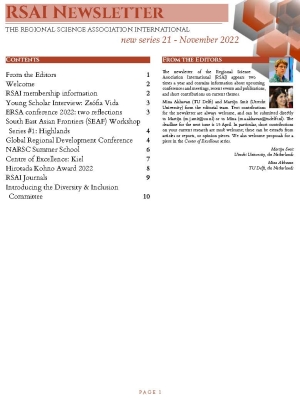
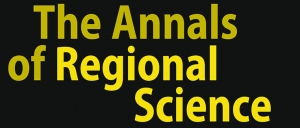
 The Annals of Regional Science.
The Annals of Regional Science. 